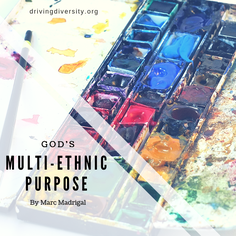 We are not the same. We each come from different backgrounds, experiences, and cultures. Some days it can seem like all these differences are more of a curse than a blessing. If only I was like everybody else, then I would fit in. But God often uses people who don’t fit to advance his kingdom. He picks the people who do not belong to do what cannot be done. Here are three quick examples. Moses was a Hebrew raised like an Egyptian. He ate at Pharaoh’s table and dressed in royal garb. But by blood, he was a Hebrew. He was born to a slave. Although he lived like a member of the royal household, we know deep down he still cared about his people. Eventually he lashed out and murdered an Egyptian who was oppressing his people. His fellow Hebrews wanted nothing to do with him. Neither a true Egyptian royal nor an authentic Hebrew, his identity crisis caused him to flee into obscurity for forty years. But God had a plan for him. Moses alone could demand an audience before Pharaoh’s court and claim a shared heritage with the people he would lead. Among the Hebrews of Egypt, he was not the same. Scripture tells us of an unlikely queen. As a Jew living under the Persian Empire, Esther’s beauty gained the attention of King Xerxes. But even as the crown was placed on her head, her true identity remained a secret to all. No one knew she was a Jew. But when a plot arose to destroy her people, Queen Esther held a unique position of influence and privilege. She alone of all the Jews could gain an audience with the King. She alone could convince him otherwise and thwart disaster. Through her talent and courage, God saved the Jewish people. Among the Jews of Persia, she was not the same. Half-Greek and half-Jew, Timothy stood out as an anomaly. He may not have been pure enough for real Jews or Greek enough for real Greeks. But when the Apostle Paul came to his hometown, carrying a unique message of reconciliation for both Greek and Jew alike, Timothy was exactly the partner Paul was looking for. To gain credibility for their journey, Timothy immediately endured the pain of adult circumcision. A bi-racial Timothy accompanied Paul to great evangelistic success and eventually shepherded God’s church like very few in the New Testament. Among the Greeks and Jews, he was not the same. As I look over these three stories, I can’t help but come to a fascinating conclusion: if God wanted us all to be the same, he would have made it so. Instead, he created us differently. He positioned us in unique situations. He made us credible, trans-cultural, and distinct among certain people in certain places. He did this because He has a greater purpose than what we might initially realize. Some of us have been given an ethnic identity that doesn’t always match our surroundings. We wonder why we stick out. We think we need to become something we’re not to survive. We may at times grow frustrated by a nagging inability to feel at home among our own people. But perhaps what appears to be a disadvantage is part of the plan. Moses wasn’t like the other Hebrews in Egypt. Esther wasn’t like the other Jews of Persia. Timothy wasn’t like the other Greeks. They weren’t the same and neither should you be. 12/29/2018 03:59:56 am
I just watched the movie "The ten commandments" yesterday. I really love the movie. It is not just about the story of Moses in Egypt, but also the good things he had made. he became the messenger of God, he followed God. He is a Hebrew, but he has a good heart that he looks in every nationality the same. He had became fair and do what is right. I admire his bravery which is the opposite of his brother, Rameses. Comments are closed.
|
Categories
All
Contributing Authors
|

 RSS Feed
RSS Feed